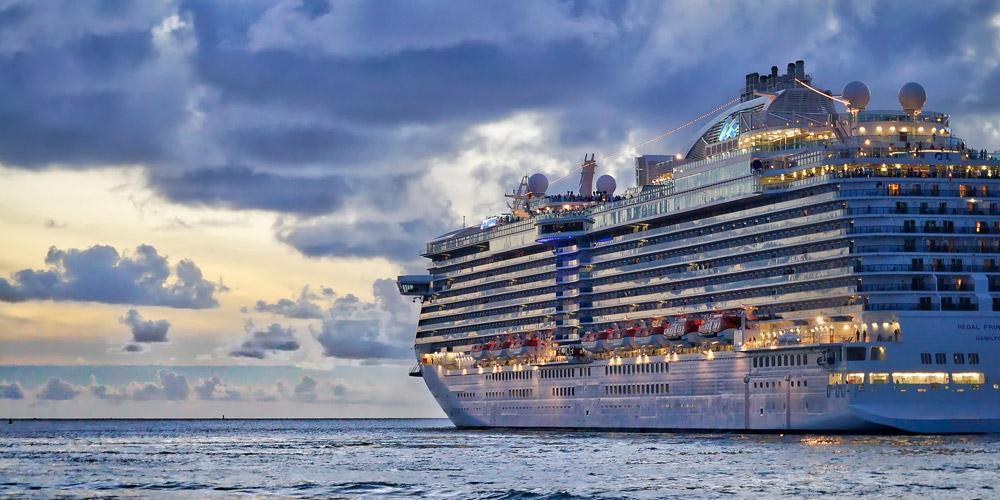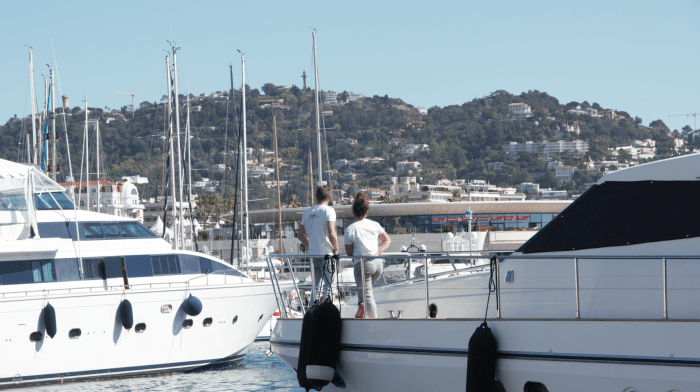If you’re someone who is currently working on-board a ship, or looking to do so, then you’ll have a whole host of experiences in front of you as you travel on the oceans.
Whether you’re a Captain on a Superyacht, working in hospitality, or an entertainer on a cruise ship, then you’re going to be classed as a seafarer. Most jobs have a list of formalities that need to be abided by, and those working on ships are no different.
Financially, there is a special tax deduction for people who are UK residents but are currently at work on-board a ship.
The special deduction is known as the Seafarer’s Earnings Deduction (SED).
So, do UK seafarers pay tax?
The Seafarer’s Earnings Deduction allows 100% of foreign earnings to be exempt from UK income tax.

In this guide, we’ll go into some detail regarding many areas of the SED and answer some of the burning questions you may have at the forefront of your mind.
1. What is Seafarers Earnings Deduction?
Seafarers Earnings Deduction (SED) is a piece of tax legislation that exempts Seafarers from paying income tax on overseas earnings. Basically, the Seafarer can claim 100% tax relief on the amount you earn.
The law came into effect in 2012 after a fifteen-year battle between trade unions and the HMRC – after a long, long dispute, they finally managed to reach an agreement.
Income tax is a source of revenue for the Government to help them fund services like the NHS, education, roads, railway infrastructure, and more. However, the argument that the trade unions presented is that Seafarers, yacht crew, and all other on-board staff spend limited time in the UK and don’t receive these benefits.
On top of that seafarers are playing a massive role in the defence needs of the UK and are among a very competitive market, so it’s was viewed only right they should receive a tax break from Her Majesty’s Revenue & Customs (HMRC).
Due to the pressure of increasing competitiveness and overall globalisation, giving offshore workers the correct financial compensation was seen as common sense and the right thing to do. The reduced tax liabilities probably should not have taken so long to have been ratified.
Unfortunately, even now yacht crew and many other seafarers still fail to use the SED exemption years after the ratification. There are many Searafers who are missing out on their earnings due to a lack of education on the matter.
After many meetings and consultations with offshore workers and all kinds of seafaring employees, it has become apparent that there is a huge percentage of people not taking advantage of this fully-operational law.
Perhaps they didn’t know the legislation existed, or maybe they felt as though they wouldn’t qualify and therefore didn’t bother. Many could have even veered away from it altogether as the regulation and rules can be quite convoluted and awkward.
The truth is if you’re a seafaring worker, then you want to look into SED to make use of such a great opportunity to save you a lot of money in taxes.
2. Do I qualify for Seafarers Earnings Deduction?
The process can be quite confusing and convoluted for many people, but the basics are as follows:
- Worked outside the UK for the qualifying period, usually 365 days.
- In each qualifying period have at least one voyage that begins and ends at a foreign port.
- You work on a “ship” (A full list of what qualifies as a ship can be found below)
If you have a valid claim, you must be able to pass through these three particular steps in order to qualify for SED. The SED law applies mainly to those in the UK, so you must first be someone who is not a tax resident outside of the UK and work on-board a ship outside of UK waters.
A detailed explanation of the three steps:
1. You’ll require a valid claim period
You will have to of worked outside the UK for a period of 365 days before you can claim SED.
A period outside the UK can be either due to employment, a period of unemployment, or a holiday/vacation abroad. As soon as this 365-day period has been attained and confirmed, it is carried on until there is a failure.
A failure occurs if at any time during the claim you spend 183 or more continuous days in the UK, or break the ‘half-day rule’.
The half-day rule is something that is applied upon each return to the UK. All days since the start of the claim are added and divided by 2 (A). Then all days spent in the UK since the start of the claim are added (B). These two figures are compared, and where (B) exceeds (A) there will be a failure in the claim period.
The claim period ends on the previous return date. After this, a new claim period must then commence from the earliest possible date of leaving the UK.
2. A valid foreign port for each employment, each tax year
Each employment in each tax year must include at least one voyage or part voyage that begins or ends at a foreign port. A voyage (or part voyage) that begins or ends at an oil or gas installation located outside the UK and outside the designated areas of the UK continental shelf can be regarded as beginning or ending at a foreign port.
3. Your employment must be aboard a ship
A seafarer is, of course, someone that works on a ship. There is no real, exact definition of a ship in tax law, but “offshore installations” are specifically NOT regarded as ships.
Due to a great deal of abuse of the exemption by non-seafarers however, an amendment came into effect in 1998, which meant that the following vessels do not qualify for SED exemption:
– Fixed Production Platforms
– Floating Production Platforms
– Mobile Offshore Drilling Units
– Flotels
At this time, Crown Employees are not eligible to claim the SED. However, employees of the Royal Fleet Auxiliary, although considered Crown Employees for tax purposes are now eligible to claim the Seafarer’s Earnings Deduction due to the nature of the organisation. Again, despite this progress, trade unions remain hopeful that there will be a future breakthrough whereby all Crown Employees who meet the eligibility criteria are able to claim the Seafarers Earnings Deduction too.
What is defined as outside the UK for SED?
Under typical circumstances, HMRC looks at being outside the 12 mile limit as being outside of the United Kingdom. However, they will accept that where a vessel leaves its UK berth before midnight and go to a foreign port – that is seen as a day out.
If a vessel was to sail from a UK port to another UK one, then it is only when it is outside of the twelve-mile limit at midnight that it is regarded as outside of the UK.
I am a resident outside of the UK, can I claim the seafaring allowance?
The EU ruled in 2011 that anyone who is a resident in a country in the European Union, or the European Economic Area (EEA), will be entitled to claim Seafarers’ Earnings Deduction in the same way as a UK resident. There needs to be a foreign port each year, and you have to have spent a sufficient amount of time out of the UK. This won’t be an issue if you meet this criteria, of course.
Something that should also be taken into account is that HMRC will ask to prove any periods of absence from the United Kingdom. You’ll need to retain the flight tickets that show your return to your home country during your leave as well as the evidence of being away on-board.
3. How to complete a seafarer tax return
As a UK resident with 365 days of qualifying work on a ship, the next thing to do after recognising that you’re able to qualify is to register for your self-assessment tax return.
If you are certain you will spend over 365 days outside the UK, we recommend registering for your self assessment before you go. There is some paperwork HMRC need to send you, and for you to sign and reply. It is a lot easier to organise this if you’re at home in the UK rather than on a ship.
If you’re an EEA resident, there’s a special form for you called R43M (SED). You can find the form online. Simply fill out everything correctly and submit to HMRC.
Records you’ll need to keep to do your seafarers tax return
To claim your Seafarers’ Earnings Deduction, you’ll need a combination of the following:
– Air tickets or travel vouchers.
– A filled-out Working Sheet (form HS205).
– Copies of hotel bills or receipts.
– Your passport and visas.
– The freeboard logs for your ship(s).
– Your seafarer’s discharge book.
4. When do I need to submit my seafarer tax return?
The time limit for submitting a tax return is the 31 January following the previous 5 April.
So this gives you nine months to complete and submit the return. In order to be able to guarantee that your return can be submitted in time, it is advised that you send all the details for your return by mid-December.
5. Common questions related to seafarers tax
Do seafarers pay national insurance?
Yes, if you’re a seafarer, then the payment of your NI contributions depend on some factors. Where you’re legally resident or domiciled has to be taken into account as well as where your vessel is registered to. Whereabouts you work will be considered, sometimes, too, along with your employer or the person who pays your wages – their location will need to be noted as well as the actual job at hand.
In terms of the vessel itself, the area in which the owner/managing owner is situated will have to be included in this list. Whether you work inside or outside UK waters is another point that should be made. And, finally, any agreements between the United Kingdom and other countries will be looked into, of course.
Will going to college or university affect my SED claim?
If you were to start college or university, it would then be impossible to claim the SED on those earnings as you are classed as ‘not performing the duties of your employment on a vessel’.
It may be possible to maintain an ongoing claim by taking holidays abroad at the appropriate time whilst you are at college, but this does not change the fact that the allowance cannot be claimed. Individual circumstances can vary, so it is always best to contact those of authority in order to find out how attendance at college will affect your tax liability and other formalities regarding everything SED-related.
Can I claim higher rate tax relief through Self-Assessment on workplace pension contributions?
There are three different ways that one may receive tax relief on your contributions. They are as follows:
1. Your employer deducts your contributions from your pay before they calculate the tax due from your pay. It then means that you receive tax relief at the highest rate of tax that you pay. This is called a ‘net pay arrangement’. You can find out if you’re in one of these schemes by asking the scheme administrator or looking at the scheme booklet yourself.
2. Your employer takes your contribution from your net pay and pays this to your pension provider on your behalf. This is likely to happen if you’re a member of a group personal pension, group self-invested personal pension, or group stakeholder pension scheme. But it could also apply to other types of personal pension schemes – this is called ‘relief at source’. The pension provider then claims back the basic rate from HMRC and adds this to your pot.
3. If you’re paying pension contributions through a ‘salary sacrifice’ arrangement agreed with your employer, this is treated as an employer contribution, with the same effect for you as receiving tax relief but also with a saving on NI contributions.
Do floating production vessels qualify for SED?
Floating production vessels do NOT qualify for Seafarers’ Earnings Deduction. Fixed installations such as FPSOs, FSUs, or Flotels do not count as the appropriate vessels in this particular instance.
Does dry-docking of a vessel affect a claim?
Yes, it’s possible for a ship in a dry dock to be seen as not being a ship of tax purposes by HMRC. When a vessel is in a dry dock, it can still be regarded as a vessel, but if the hull of the vessel is breached, then the attitude of HMRC is that it then ceases to be a ship – this is due to the fact that it’s ‘not capable of being used in navigation’. It’s vital to keep them informed if your current ship is operating under those kinds of circumstances.
Does standing by a new build affect the seafaring allowance?
The standpoint of HMRC is that this is based on the premise that whilst standing by a new build, you aren’t quite ‘performing the duties of your employment on-board a vessel’. A new build does not become a vessel until the date of its first sea trials.
At that point, HMRC will consider that the vessel is ‘capable of and used in navigation’ and so the seafaring allowance can be claimed only from then on.
How many days’ holiday per year can be included in the build-up of a claim?
There isn’t a set limit of how many holidays or days away, one can have with regards to their seafaring claim.
All that matters is the number of days spent away from the United Kingdom – whether these days are due to vacation makes absolutely no difference. They aren’t interested in this kind of small info when it comes to the formalities.
If I have another job within the United Kingdom, will this affect my claim, and if so, how?
Nope. The claim you make is determined solely with regards to the dates entering and leaving the United Kingdom. A second job does not, in any way, shape, or form, affect the claim you make. There will need to be a declaration of the second income on your tax return as this can affect your overall tax liability.
You should probably keep in mind that, for any tax year where you clear your liability due to a seafaring claim, the allowance doesn’t extend to any other income.
It can mean your personal allowances may be offset against other forms of income, and this can lead to a refund of a portion of that income tax, too.
Does the leave I take after a claim also count as qualifying days?
No, to put it plainly. When those in charge look to settle your taxes for a year in which your seafaring claim has ended, they’ll look to claim the allowance for the period of voyage leave taken immediately following a successful claim. Those leave days, however, will not be used in the calculation of your claim. One’s seafaring claim is determined solely with reference to their dates of entering and leaving the United Kingdom.
What evidence is necessary in order to prove a holiday abroad?
The tax office does not give a precise definition of what is required when it comes to completely proving one’s holiday abroad, so the way in which you’d go about it is fairly ambiguous and, again, convoluted for many of those who attempt to claim. Simply put, it is best to provide at least a ticket from your airline or ferry in order to prove that you have travelled. It also helps to show statements proving that you’ve made transactions outside of the UK, too. With these, you’re obviously giving concrete evidence and a clear indication that you were away on the dates you give.
The reason for the amount of proof required is that, as you’d expect, many people have attempted to fraudulently claim – an in-depth process is therefore necessary to flush out illegitimate behaviour. People have been caught in the past claiming to have spent time abroad when they travelled back on the correct dates but did not stay out of the UK for the entire period. They’ve also been caught for lying completely and not travelling at all.
Why do I hear people bring up the anniversary date of a claim so often?
The anniversary date plays absolutely no part in your seafaring claim. It isn’t part of the rules for qualifying and never has been, so that’s not something to look into too seriously. The only piece of information in terms of relevance that you might wish to take into account is that a new claim has to extend over a minimum of one year.
When is a ship no longer deemed a ship for the purposes of Seafarers’ Earnings Deduction?
HMRC say that they consider a ship to cease being so for tax purposes on the day it docks to undertake conversion to an FPSO (floating production storage and offloading) vessel. Even if the FPSO then sails, say, halfway around the world to a permanent location, it is not regarded as a vessel for SED purposes. The point here is that, to be considered as a qualifying vessel, it is necessary to consider the function as well as its abilities. They consider the FPSO, despite its ability and power to sail so far across the planet, as not a vessel – this is because it’s operating solely as an FPSO.
As mentioned in previous points, there is a discussion to be had, and HMRC would be open to a healthy debate and challenge. It’s just a case of opening up a long-term dispute with extremely expensive charges along the way.
6. Can I get help paying my seafarers tax?
There is no getting around the fact that HMRC do not make it an easy and straight forward process for you to claim Seafarers’ Earnings Deduction.
Not completing your tax return or doing it incorrectly will come back to bite you sometime in your life. Instead of paying nothing, you may have to pay the full income tax of your earnings and potentially a fine on top.
We run a seafarers tax service for all UK crew. For £210 per year we will complete your tax return and make sure it is done correctly so you pay no income tax, which will save you so much money, time and stress.





